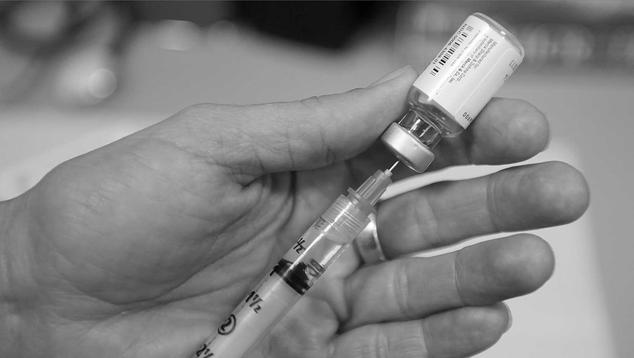The new Wellcome Global Monitor survey on attitudes toward science and health reveals pockets of doubt about the safety, effectiveness and importance of vaccines in some parts of the world -- including places such as the U.S., which is currently experiencing its worst measles outbreak since 1992.
Worldwide, nearly eight in 10 people (79%) who have heard of vaccines say they "strongly" or "somewhat" agree that vaccines are safe. On its face, this percentage might seem like good news. However, if everyone who found vaccines safe was inoculated, this figure would fall short of the percentage of the population that needs to be vaccinated to achieve "herd immunity" to prevent the spread of diseases such as measles and polio.
Americans are even more skeptical than the global average, with 72% strongly or somewhat agreeing that vaccines are safe. Twenty-eight percent of Americans do not agree that vaccines are safe -- including 17% who say "neither agree nor disagree," don't know or refuse to answer, and 11% who strongly or somewhat disagree.
Americans are not the least confident nationality in the world about vaccine safety -- that badge goes to people in Ukraine, who are dealing with their own measles outbreak and where just 29% agree that vaccines are safe. And neither are Americans the most skeptical: The French lead the world in disagreeing that vaccines are safe (33%).
However, Americans do have much in common with people in a number of other middle- to higher-income countries who, collectively, are more likely than people in lower-income countries to doubt (or at least not affirm) the safety of inoculations.
| Agree | Disagree | Neither agree nor disagree | |||||||||||||||||||||||||||||||||||||||||||||||||||||||||||||||||||||||||||||||||||||||||||||||||
|---|---|---|---|---|---|---|---|---|---|---|---|---|---|---|---|---|---|---|---|---|---|---|---|---|---|---|---|---|---|---|---|---|---|---|---|---|---|---|---|---|---|---|---|---|---|---|---|---|---|---|---|---|---|---|---|---|---|---|---|---|---|---|---|---|---|---|---|---|---|---|---|---|---|---|---|---|---|---|---|---|---|---|---|---|---|---|---|---|---|---|---|---|---|---|---|---|---|---|---|
| % | % | % | |||||||||||||||||||||||||||||||||||||||||||||||||||||||||||||||||||||||||||||||||||||||||||||||||
| France | 47 | 33 | 20 | ||||||||||||||||||||||||||||||||||||||||||||||||||||||||||||||||||||||||||||||||||||||||||||||||
| Russia | 45 | 24 | 32 | ||||||||||||||||||||||||||||||||||||||||||||||||||||||||||||||||||||||||||||||||||||||||||||||||
| Germany | 67 | 13 | 20 | ||||||||||||||||||||||||||||||||||||||||||||||||||||||||||||||||||||||||||||||||||||||||||||||||
| U.S. | 72 | 11 | 17 | ||||||||||||||||||||||||||||||||||||||||||||||||||||||||||||||||||||||||||||||||||||||||||||||||
| U.K. | 75 | 9 | 16 | ||||||||||||||||||||||||||||||||||||||||||||||||||||||||||||||||||||||||||||||||||||||||||||||||
| Japan | 34 | 8 | 58 | ||||||||||||||||||||||||||||||||||||||||||||||||||||||||||||||||||||||||||||||||||||||||||||||||
| China | 72 | 8 | 19 | ||||||||||||||||||||||||||||||||||||||||||||||||||||||||||||||||||||||||||||||||||||||||||||||||
| Percentages of people who answer Strongly agree/Somewhat agree, Strongly disagree/Somewhat disagree, and Neither agree nor disagree; Countries listed are home to a large percentage of the world's researchers | |||||||||||||||||||||||||||||||||||||||||||||||||||||||||||||||||||||||||||||||||||||||||||||||||||
| Wellcome Global Monitor | |||||||||||||||||||||||||||||||||||||||||||||||||||||||||||||||||||||||||||||||||||||||||||||||||||
Interestingly, U.S. parents -- though not necessarily of minor children -- are notably less likely to strongly agree that vaccines are safe than are U.S. adults who say they do not have children -- 60% vs. 78%, respectively. U.S. parents are about twice as likely as nonparents to disagree vaccines are safe (13% vs. 7%).
The question that Wellcome Global Monitor asked about the safety of vaccines was one of three vaccine-related questions it posed in the U.S. and more than 140 other countries in 2018. The Wellcome Global Monitor also asked people who had heard of vaccines whether they agreed or disagreed that vaccines are effective and important for children to have. Together, the responses on these questions can be used to gauge the confidence that a population has in vaccines.
In the U.S. and many countries around the world, skepticism about the safety of vaccines doesn't necessarily translate into skepticism about the effectiveness of vaccines. Eighty-four percent of Americans strongly or somewhat agree that vaccines are effective, considerably higher than the 72% of Americans who agree they are safe. The gap suggests that some people accept that vaccines are effective at preventing certain diseases, even if they believe they might have some negative side effects.
The 84% of Americans who agree on some level that vaccines are effective matches the global average, and it is similar to agreement levels in the U.K. (86%) and Germany (83%). Americans are more likely than the French (68%), Japanese (62%) and Russians (61%) to agree that vaccines are effective.
| Agree | Disagree | Neither agree nor disagree | |||||||||||||||||||||||||||||||||||||||||||||||||||||||||||||||||||||||||||||||||||||||||||||||||
|---|---|---|---|---|---|---|---|---|---|---|---|---|---|---|---|---|---|---|---|---|---|---|---|---|---|---|---|---|---|---|---|---|---|---|---|---|---|---|---|---|---|---|---|---|---|---|---|---|---|---|---|---|---|---|---|---|---|---|---|---|---|---|---|---|---|---|---|---|---|---|---|---|---|---|---|---|---|---|---|---|---|---|---|---|---|---|---|---|---|---|---|---|---|---|---|---|---|---|---|
| % | % | % | |||||||||||||||||||||||||||||||||||||||||||||||||||||||||||||||||||||||||||||||||||||||||||||||||
| France | 68 | 18 | 14 | ||||||||||||||||||||||||||||||||||||||||||||||||||||||||||||||||||||||||||||||||||||||||||||||||
| Russia | 61 | 12 | 27 | ||||||||||||||||||||||||||||||||||||||||||||||||||||||||||||||||||||||||||||||||||||||||||||||||
| U.S. | 84 | 6 | 10 | ||||||||||||||||||||||||||||||||||||||||||||||||||||||||||||||||||||||||||||||||||||||||||||||||
| Japan | 62 | 3 | 35 | ||||||||||||||||||||||||||||||||||||||||||||||||||||||||||||||||||||||||||||||||||||||||||||||||
| Germany | 83 | 3 | 14 | ||||||||||||||||||||||||||||||||||||||||||||||||||||||||||||||||||||||||||||||||||||||||||||||||
| China | 79 | 3 | 18 | ||||||||||||||||||||||||||||||||||||||||||||||||||||||||||||||||||||||||||||||||||||||||||||||||
| U.K. | 86 | 3 | 12 | ||||||||||||||||||||||||||||||||||||||||||||||||||||||||||||||||||||||||||||||||||||||||||||||||
| Percentages of people who answer Strongly agree/Somewhat agree, Strongly disagree/Somewhat disagree, and Neither agree nor disagree; Countries listed are home to a large percentage of the world's researchers | |||||||||||||||||||||||||||||||||||||||||||||||||||||||||||||||||||||||||||||||||||||||||||||||||||
| Wellcome Global Monitor | |||||||||||||||||||||||||||||||||||||||||||||||||||||||||||||||||||||||||||||||||||||||||||||||||||
Americans are also more likely to strongly or somewhat agree that vaccines are important for children to have (87%) than they are to agree that vaccines are safe. On this question, Americans lag behind the global average (92%) -- but their opinions are roughly in line with residents of the U.K. (89%) and Germans (89%), while more supportive than the French, Russians and Japanese.
| Agree | Disagree | Neither agree nor disagree | |||||||||||||||||||||||||||||||||||||||||||||||||||||||||||||||||||||||||||||||||||||||||||||||||
|---|---|---|---|---|---|---|---|---|---|---|---|---|---|---|---|---|---|---|---|---|---|---|---|---|---|---|---|---|---|---|---|---|---|---|---|---|---|---|---|---|---|---|---|---|---|---|---|---|---|---|---|---|---|---|---|---|---|---|---|---|---|---|---|---|---|---|---|---|---|---|---|---|---|---|---|---|---|---|---|---|---|---|---|---|---|---|---|---|---|---|---|---|---|---|---|---|---|---|---|
| % | % | % | |||||||||||||||||||||||||||||||||||||||||||||||||||||||||||||||||||||||||||||||||||||||||||||||||
| France | 76 | 10 | 14 | ||||||||||||||||||||||||||||||||||||||||||||||||||||||||||||||||||||||||||||||||||||||||||||||||
| Russia | 77 | 9 | 13 | ||||||||||||||||||||||||||||||||||||||||||||||||||||||||||||||||||||||||||||||||||||||||||||||||
| U.S. | 87 | 6 | 7 | ||||||||||||||||||||||||||||||||||||||||||||||||||||||||||||||||||||||||||||||||||||||||||||||||
| Japan | 66 | 5 | 29 | ||||||||||||||||||||||||||||||||||||||||||||||||||||||||||||||||||||||||||||||||||||||||||||||||
| Germany | 89 | 4 | 7 | ||||||||||||||||||||||||||||||||||||||||||||||||||||||||||||||||||||||||||||||||||||||||||||||||
| U.K. | 89 | 4 | 7 | ||||||||||||||||||||||||||||||||||||||||||||||||||||||||||||||||||||||||||||||||||||||||||||||||
| China | 90 | 2 | 8 | ||||||||||||||||||||||||||||||||||||||||||||||||||||||||||||||||||||||||||||||||||||||||||||||||
| Percentages of people who answer Strongly agree/Somewhat agree, Strongly disagree/Somewhat disagree, and Neither agree nor disagree; Countries listed are home to a large percentage of the world's researchers | |||||||||||||||||||||||||||||||||||||||||||||||||||||||||||||||||||||||||||||||||||||||||||||||||||
| Wellcome Global Monitor | |||||||||||||||||||||||||||||||||||||||||||||||||||||||||||||||||||||||||||||||||||||||||||||||||||
However, it's important to point out that the 87% of Americans who agree that vaccines are important for children still falls short of the 90% to 95% vaccination uptake required for herd immunity to measles. The same is true for all the other major countries -- except China, which achieves the bare minimum agreement at 90%.
Trust in Scientists and Attitudes Toward Vaccines
There is a clear, positive relationship between overall trust in scientists, based on the Wellcome Global Monitor Trust in Scientists Index, and overall attitudes toward vaccines. (For more information on this index, please see the report.) The relationship is strongest in higher-income countries such as the U.S., where there are large differences in perceptions of vaccines by overall levels of trust in scientists, especially on the question of vaccine safety.
In the U.S. -- and in most other countries included in the study -- high trust in scientists is linked to higher levels of confidence in vaccine safety, effectiveness and importance. People with lower levels of trust in scientists are less likely to agree that vaccines have these attributes.
| Low trust | Medium trust | High trust | |||||||||||||||||||||||||||||||||||||||||||||||||||||||||||||||||||||||||||||||||||||||||||||||||
|---|---|---|---|---|---|---|---|---|---|---|---|---|---|---|---|---|---|---|---|---|---|---|---|---|---|---|---|---|---|---|---|---|---|---|---|---|---|---|---|---|---|---|---|---|---|---|---|---|---|---|---|---|---|---|---|---|---|---|---|---|---|---|---|---|---|---|---|---|---|---|---|---|---|---|---|---|---|---|---|---|---|---|---|---|---|---|---|---|---|---|---|---|---|---|---|---|---|---|---|
| % | % | % | |||||||||||||||||||||||||||||||||||||||||||||||||||||||||||||||||||||||||||||||||||||||||||||||||
| All U.S. adults | 13 | 56 | 25 | ||||||||||||||||||||||||||||||||||||||||||||||||||||||||||||||||||||||||||||||||||||||||||||||||
| Vaccines are safe (% Agree) | 48 | 70 | 88 | ||||||||||||||||||||||||||||||||||||||||||||||||||||||||||||||||||||||||||||||||||||||||||||||||
| Vaccines are effective (% Agree) | 65 | 84 | 95 | ||||||||||||||||||||||||||||||||||||||||||||||||||||||||||||||||||||||||||||||||||||||||||||||||
| Vaccines are important for children to have (% Agree) | 72 | 85 | 98 | ||||||||||||||||||||||||||||||||||||||||||||||||||||||||||||||||||||||||||||||||||||||||||||||||
| Wellcome Global Monitor | |||||||||||||||||||||||||||||||||||||||||||||||||||||||||||||||||||||||||||||||||||||||||||||||||||
Implications
Although some Americans have their doubts about the safety of vaccines, 93% of U.S. parents say at least one of their children has been vaccinated -- which suggests their doubts may not prevent them from inoculating their children. Nonetheless, the recent measles outbreak in the U.S. illustrates how dangerous it is to take herd immunity for granted, given that this form of indirect protection is only effective once the population has reached a 95% immunization rate.
These data need to be acted upon to arrest the slide in coverage and inhibit the spread of further preventable illnesses that most significantly affect the young and old -- the most vulnerable in society.
More detailed analysis about the world's attitudes toward science -- including vaccines -- is available in the Wellcome Global Monitor report, and the data are open to the public through the Wellcome website.



